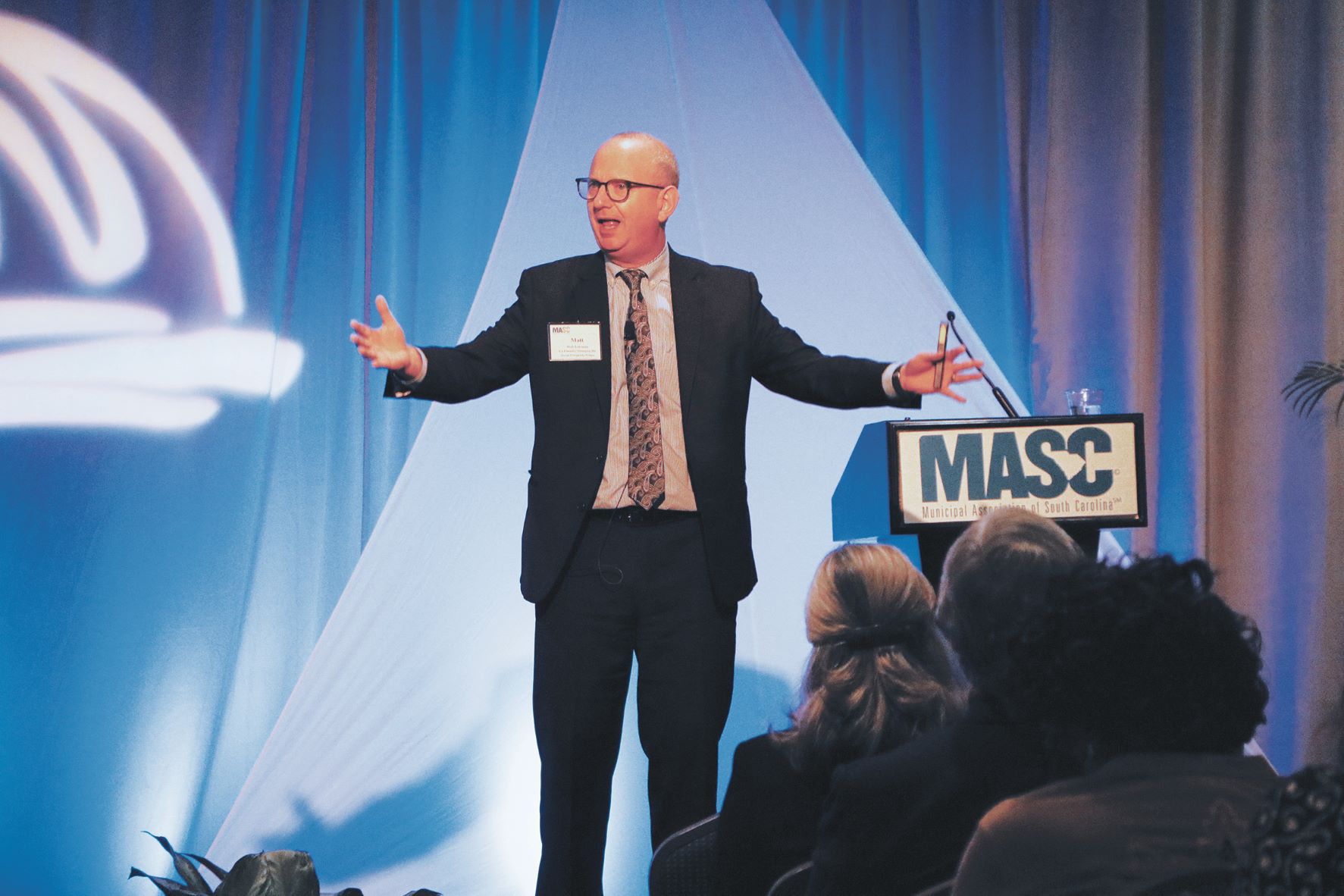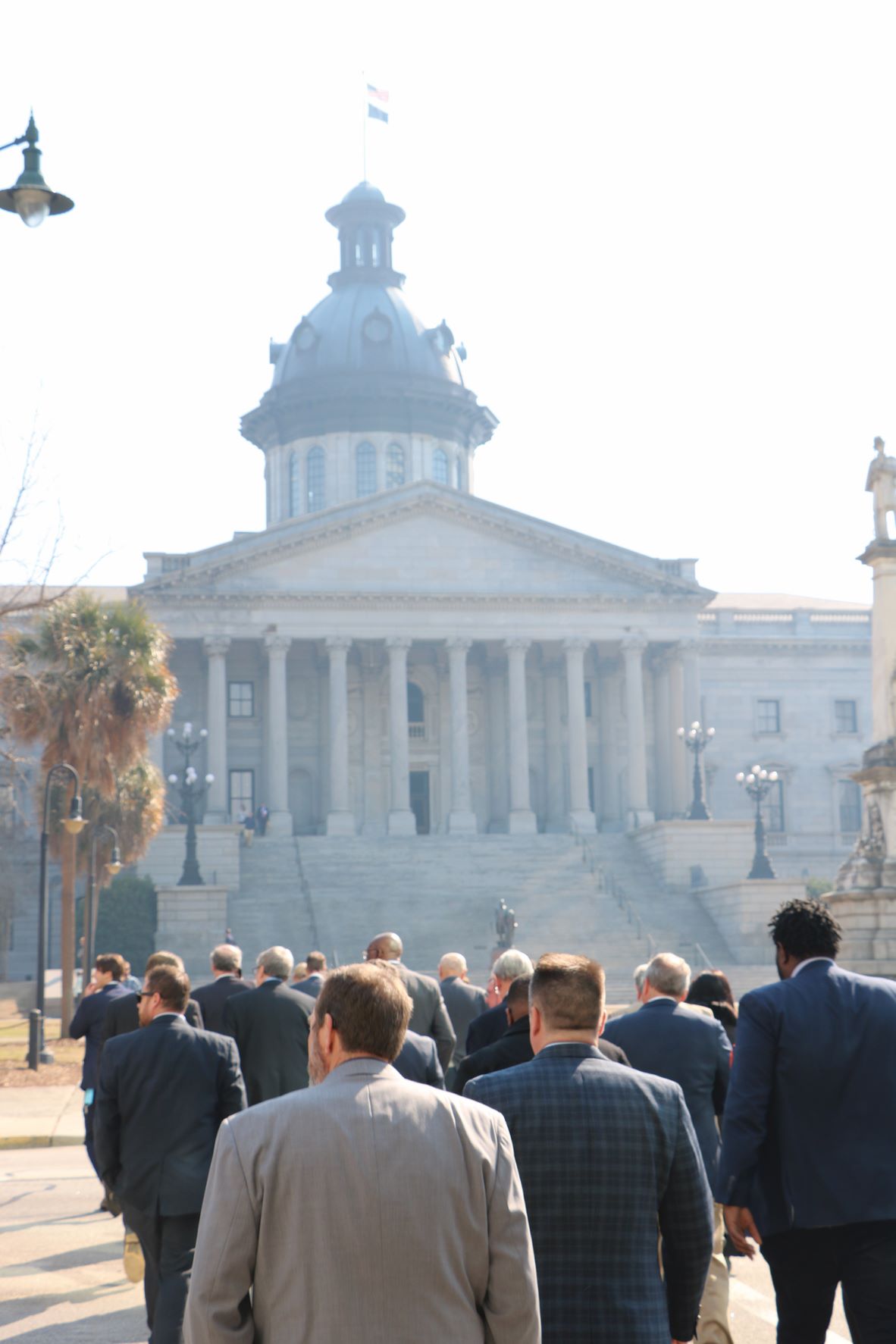
Matt Lehrman speaks during Hometown Legislative Action Day.
Matt Lehrman, the co-founder and managing director of Social Prosperity Partners, posed a simple question to the attendees of Hometown Legislative Action Day in February: how can government leaders move public discourse from conflict to conversation?
“Disagreement is not to be avoided,” Lehrman said. “Human nature is to disagree. My wife and I, we love each other. We still manage to disagree, a large amount of the time … The question is does it have to be disagreeable? Does the disagreement have to tear us apart?”
Lehrman asked his audience to provide him with the emotions that civic engagement in their community creates. While some of the descriptions were positive — such as “hopeful,” “welcomed,” “invested” or “energized” — others were not, like “frustrated,” “confused,” “angry” or “discouraged.”
He spoke of the purpose of local government — to “enable individuals to join together in recognizing and solving community problems.”
“This is the tension,” he said, “The purpose of local government is to enable individuals on the one hand, and we’ve got to balance that with community needs on the other.”
He offered multiple tips on how to improve civil discourse, beginning with finding ways to affirm community values. Having recently spoken before the North Dakota Municipal League, he gave the example of an administrator of a small rural town, who told him of a councilmember who refused to have an official email address out of a desire to not be contacted by constituents. She reminded the councilmember that a recent council project defined the town’s core values as teamwork, communication, stewardship, community engagement, and being responsive, among others.
The administrator told Lehrman that when someone had been a part of this conversation, “you can’t not have an email address. You can’t not respond to people when you have made yourself publicly accountable.”
He noted that necessary conversations can be difficult even in the context of agreed-upon values, and gave the example of “Life, Liberty and the pursuit of Happiness” from the Declaration of Independence as a widely held community value.
“We waste a lot of energy saying, ‘your liberty is infringing on my life. Your pursuit of happiness can’t be at the expense of my liberty.’ I would respectfully say those are real issues. But even without those issues at play, there’s a lot that we can agree on,” he said. “I’m not saying we shouldn’t take on those hard issues. But I’m also saying sometimes it’s okay to say well what can we agree on that doesn’t put these values at conflict with each other.”
Lehrman advocated for “courageous conversations” in which people admit to not having all the answers and showing a willingness to listen. Communication in the form of announcements, press releases and making documents available on a website, for example, does not mean that the government is listening, he said.
“I have attended a zillion outreach meetings. 90% of the outreach meetings I have attended are presentations of information but no listening. So I will acknowledge that the average meetings could be a place for courageous conversation. In practice, they are not often [such a place.]” he said.
He added that, in the absence of forums to talk to the government, residents are likely to turn to the conflict-heavy forums of social media.
“If you don’t create the venue for courageous conversations, others will,” he said.
Lehrman also called for local leaders to handle the emotions of discourse carefully — for example, responding to anger with calmness, responding to fear with caring, or responding to disgust with respect.
Lehrman concluded with a reminder that local leaders serve as role models for civil discourse and problem solving.
“How might we join together to contribute to the recovery and health and collaborative spirit of our community?” he asked. “This is the question you put forth in your community to bring your residents or citizens together. You as the community leaders have the power to empower people to inspire them to energize by inviting them into this conversation.”

City and town officials visited members of their legislative delegation during
Hometown Legislative Action Day.
Other Hometown Legislative Action Day sessions
Legislative panel discussions during HLAD featured lawmakers, congressional staff and Municipal Association advocacy staff addressing everything from law enforcement reform to federal advocacy and the issues under discussion at the State House during 2022.
In her remarks as the president of the Municipal Association, City of Rock Hill Councilmember Kathy Pender praised the ways that South Carolina’s cities and towns have risen to the challenges of the pandemic. She quoted the recently deceased Archbishop Desmond Tutu, who said that “hope is being able to see that there is light despite all of the darkness.”
“Be that light to your community and to South Carolina,” Pender said. “Be that light to your colleagues, staff and legislators.”
In his remarks, Todd Glover, executive director of the Municipal Association of SC, stressed the importance of personal advocacy from municipal leaders at the State House, and also discussed civility in government as one of the focus areas of the Association’s strategic plan. Matt Lehrman’s presentation served as an inaugural part of this focus on civility.
“We’re losing good public servants because they’re growing tired of dealing with the incivility that we’re having,” Glover said. “We’re losing good people who don’t want to run for office because they don’t want to deal with it. We’ve got elected officials angry at one another, we’ve got citizens angry at our elected officials and we’ve got citizens angry at other citizens. Social media keeps us inflamed 24/7 and half the time, it is not even accurate information. Winston Churchill once said that a lie travels around the world before the truth puts on its pants. That man lived 75 years before Facebook and Twitter. It is difficult, but we can lead the charge to bring civility back to what we do because civility means good government.”
Find audio recordings and presentations from HLAD at www.masc.sc (keyword: HLAD).
